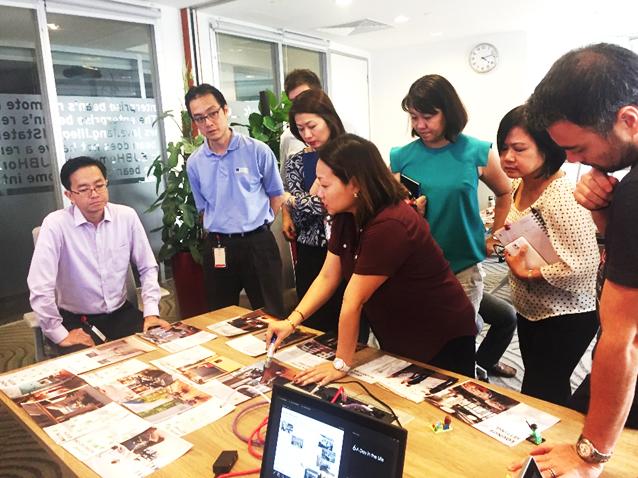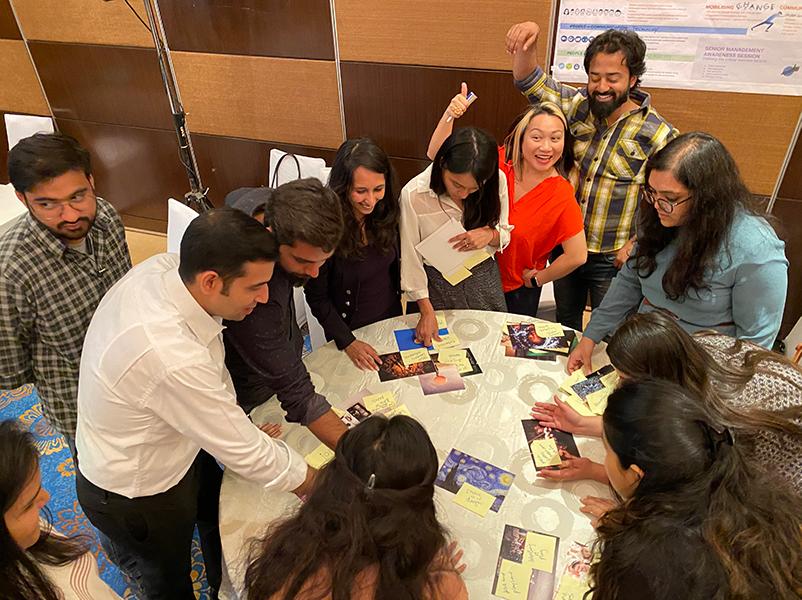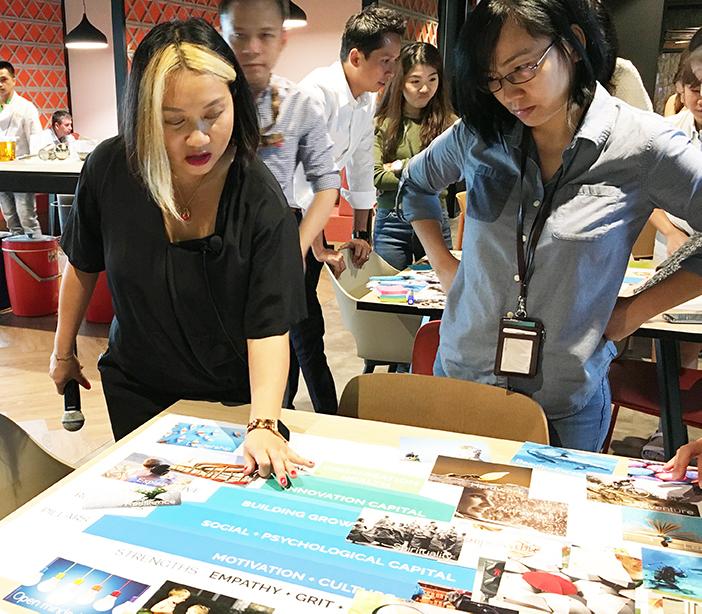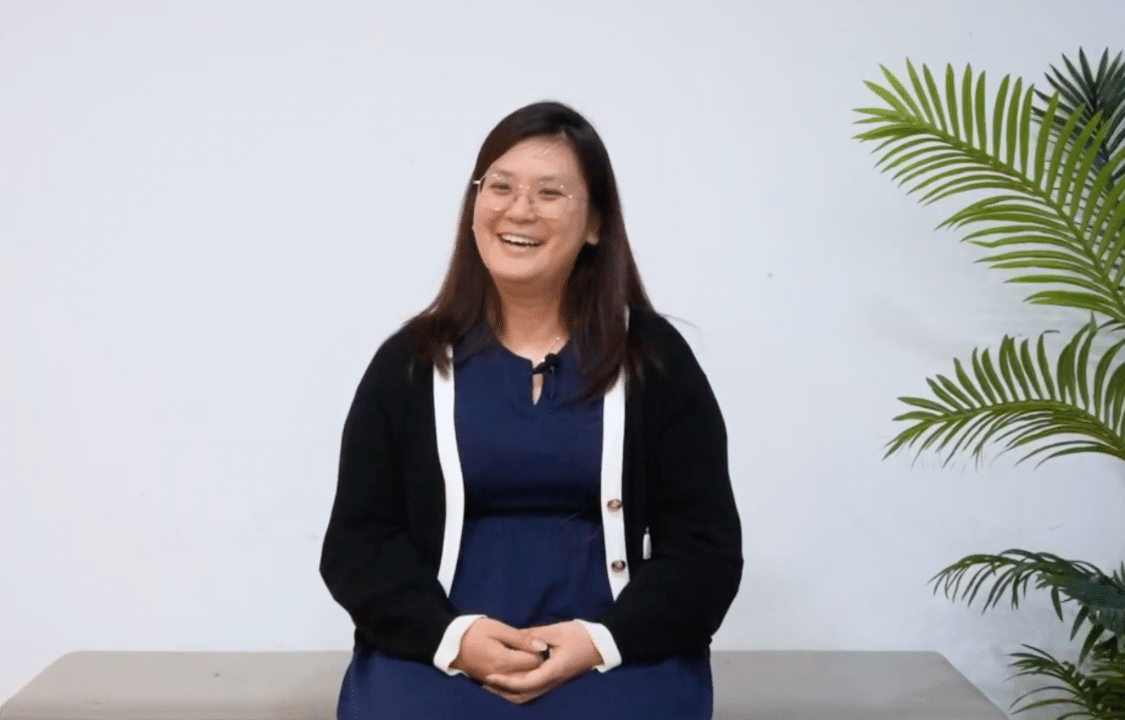Su-San builds inclusive spaces by applying her education in Positive Organisational Psychology into her professional work in the corporate world of designing and building workplaces.
She brings insights into the opportunities and challenges for organisations getting serious about wellbeing.
Su-San Tan
Senior Director, Workplace Strategy and Change Insights, Space Matrix Interior Architects
Adjunct Lecturer, TSPP
Masters of Applied Positive Psychology, Anglia Ruskin University
Post Graduate Diploma in Positive Organisational Psychology and Leadership, TSPP
Graduate Diploma Applied Positive Psychology, TSPP
Q: Can you share how you have applied Positive Psychology in your current line of work?
As the Director for Workplace Strategy and Change Insights at a corporate interior design company, my clients are global corporate organisations at the forefront of challenging work norms and reshaping the future of work. To understand the impact of new ways of working on people’s lives and how we design spaces for work, we engage with employees to understand their experiences, needs and expectations for working at the office and working from anywhere.

Businesses are having to reassess their talent strategies as people evaluate their priorities personally and professionally around work-life balance. Employees are making decisions around which companies they work for, and are conscious about ESG and brand association.
Societal perspectives have shifted. There is greater advocacy towards environmental responsibility, empathetic leadership styles, conscious consumers, authentic experiences, convenience factors, inclusive cultures, physical and mental wellness pursuits. Numerous surveys have shown that organisations that have not actioned strategies around these factors show lower rates of employee engagement and loyalty.
To authentically engage people around conversations that go beyond space and place, we have found it useful to apply a combination of strengths-based approaches closely steeped in positive psychology principles. Acknowledging the challenges and resilience of employees in the pandemic through open conversations, helped us to create safe environments to speak openly about designing their future work life experiences.
Q: What are some of the opportunities and challenges in getting more organisations on board with wellbeing?
With the large-scale changes over the past two and half years, it is hard to find any leader who is not concerned with the physical, mental and social wellbeing of their employees. Many organisations are using this opportunity to redefine the dynamics between work, workforce and workplace. The term hybrid work, flexible schedules and work life balance is no stranger to many organisations. Mental health and wellbeing at work are at the forefront of conversations globally. Many organisations rolled out wellbeing initiatives right from their initial stages of covid lockdown, and some continued to evolve them as people return to the workplace.
What we have learnt from client conversations is that the challenge lies in keeping up the momentum, and activating wellbeing initiatives that are consistent and not one-offs. Through a combination of policies and practices, their effectiveness is varied. The benefits of these wellbeing programmes also need to be clearly demonstrated, measurable and experienced authentically to assess their impact and allow continuous improvement.
Q: How has the atmosphere of work changed for you?

Balancing priorities and work and life have always been important for me. I joined my company in the middle of 2019 and the pandemic hit six months later. My perfectionist tendencies and self-expectations of adjusting to a different organisational culture took a toll on my mental health.
I am grateful for the peer and leadership support as we navigated through various lockdowns. Leaning on each other, expressing our vulnerabilities, and catching a glimpse of our home lives actually brought us all closer to each other.
What people shared coming out of loneliness, lockdowns and work from home, was the need to reconnect with their peers and rekindle a sense of belonging to their organisation. Having had a taste of autonomy with WFH, people now value being entrusted with maintaining flexible schedules. For some, going back to a 9-to-5 daily commute brought on greater anxiety and resentment. Employee and employer ‘contracts’ – both legal and social – have shifted in expectations and relationships. Employees want to enjoy a total rewards scheme and the ability to bring their entire selves to work.
For me, I learned that emotions have a place at work and it was ok for me to not be ok all the time. Stoicism has its place. But compassion and authenticity go a long way as intrinsic motivation to why people choose one company over the next. People stay because they have a direct manager who cares about their experiences – their wellbeing and growth. To become kinder, I have decided I am better off investing my energy in action and interaction. There is no substitute for being available to employees, to share your time and experiences with them.
For every office that our studios have designed and built in the last two years, we asked leaders ‘‘what success looks like”. The answers were universal – it is when their people are “physically, mentally and socially well; are happy and want to come to work, wherever that may be, and if they succeed in the work they do”.
Q: How have you navigated and applied Positive Psychology Interventions (PPIs) in the workplace?

I have the privilege of speaking with a cross-section of people across organisations. My experience is that workplace transformation is an integral twin to cultural transformation initiatives. A physical office space does not in itself change culture. People change culture. Bringing together a group of people together to design their new office can be powerful and unifying when managed well.
Over the eight years of Positive Psychology education, I intentionally crafted my assignments to elevate my communication skills. The applied aspect of the courses presented me with the opportunity to pilot and recalibrate the PPIs which were useful (for both the client and for me) in navigating difficult conversations and guiding people through change.
Q: What is an effective way to pitch Positive Psychology to teams?
I make a conscious effort never to sell “Positive Organisational Psychology”. Instead, I adopt a more consultative approach which uses Positive Psychology Interventions (PPI) as part of a holistic approach. I have found clients to be more receptive when they understand the reasons behind my recommendations using PPIs which are more effective, albeit novel and attuned to help the client engage in better problem-solving.
Q: What are some of the notable transformations you have seen in people/organisations you’ve worked with?
Organisations that have moved away from a command-and-control leadership style to a more autonomous style where people have agency have the most positive change stories. These organisations make room to engage the wisdom of their employees as architects of their own change. They understand that people are not opposed to change. They oppose being told to change without being heard.
Q: What sparked your journey to pursue Positive Psychology with TSPP?
When I first learnt about the Graduate Diploma in Applied Positive Psychology (GDAPP), I was intrigued but hesitant to sign up. I travel for work seventy-five percent of my time and felt incapable of committing to a consistent study schedule. With the encouragement of the TSPP teachers; support from leadership at my work to go easy on my travel; and armed with a sense of curiosity amidst a state of personal languishing, I signed up and embarked on a journey of self-discovery.
I was invigorated by the energy of my coursemates – their stories and experiences – their motivation to make a difference in society. We laughed. I cried. We came together as a community of like-minded people who wanted to improve themselves through the science of flourishing, and help in the process, help others. I got to understand myself better. I felt like someone shone a light inside me to help me see my own narratives. The course expanded my vocabulary around wellbeing; helped me to develop emotional agility, apply my character strengths; and challenged my belief systems.
After 3 years, I embarked on the Postgraduate Diploma of Positive Organisational Psychology and Leadership (PGDPOPL). It gave me the opportunity to apply what I learned to the context of workplace transformation in corporate office design. The Masters in Applied Positive Psychology (MAPP) brought me deeper into research methods and designing evidence-based research projects. For my major project, I designed an artefact that has been very useful in my work in broadening conversations around wellbeing in the workplace, especially during the pandemic.
Q: Can you share some key learnings with us?
I never imagined that doing these courses would make such a difference to my personal wellbeing and purpose. I was insane. Well, I’m using Albert Einstein’s definition of Insanity which is “doing the same thing over and over again and expecting different results”. If you can imagine doing better, you can start thinking better or rather, differently. Change happens in small consistent steps. Take the step. We are all a work in progress. I know I’m not there yet but at least I’m not where I used to be.

Inspired to embark on your own transformation journey? Find out more on the course that Su-San completed.
Are you a TSPP alumni or current student and keen to connect with like-minded people like Su-San? Join our next TSPP Ripples Network Night – a series of networking sessions for TSPP alumni and friends to collaborate and create ripples of change in the world together!


